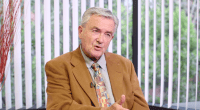Keyword: Fethullah Gulen

Expert’s opinion: Turkey’s Demanding Extradition Of Fethullah Gülen Is Frivolous Grandstanding
Although ordinarily I respect his cool-headedness and self-control, in hindsight I wish President Obama had been equally blunt in responding to President Erdoğan’s demands that the US extradite Fethullah Gülen. All of his demands, beginning in 2014 and vigorously renewed in the wake of the July 15 attempted coup, have been completely illegitimate and unfair.

U.S. Not Persuaded to Extradite Fethullah Gulen Over Turkey Coup
Officials aren’t convinced by evidence against Fethullah Gulen, Pennsylvania-based imam who Turkey says masterminded the failed putsch. U.S. officials don’t expect to extradite an imam Turkey blames for masterminding a failed coup because they aren’t convinced by the evidence Ankara has presented so far and are troubled by threatening public statements from Turkish officials, according to people familiar with the discussions.

Commentary: Abuses rampant in wake of Turkish coup
We don’t know a lot. But what we do know should cause us to ask our elected officials to look carefully at any request for extradition for Fethullah Gulen. We don’t know everything, but we know that the post-coup crackdown has included public appeals “to be protected from the evil things of educated people.” Nearly 60,000 have been detained. Some 1,600 university academic deans have been relieved of their positions.

Gulen: Issuance of arrest warrant changes nothing about my views
The issuance of an arrest warrant from a Turkish court changes nothing about my status or my views. I have repeatedly condemned the coup attempt in Turkey and denied any knowledge or involvement. It is well-documented the Turkish court system is without judicial independence, so this warrant is yet another example of President Erdogan’s drive authoritarianism and away from democracy.

Fethullah Gulen — His Vision, Our Response
A Muslim religious leader, Fehullah Gulen, is daily in the news, as Turkish president Erdogan accuses him of plotting the recent coup, calling him a terrorist. We are so used to Muslim clerics being or being considered terrorists that we give the matter little thought.

Turkey’s Erdogan vows to cut off revenues of Gulen-linked businesses
“The business world is where they are the strongest. We will cut off all business links, all revenues of Gulen-linked business. We are not going to show anyone any mercy,” Erdogan said, describing the detentions so far as just the tip of the iceberg. The Turkish authorities had already seized a bank, taken over or closed several media companies, and detained businessmen on allegations of funding the cleric’s movement ahead of the failed coup attempt.

Turkey’s New Anti-Americanism (NY Times Editorial)
The Turks need to be reminded that Mr. Gulen has a legal right to be in the United States, and that the Justice Department would have to go through a rigorous process before deciding whether he could be handed over, especially to a country where due process is increasingly unlikely and torture is reportedly used against detainees.

Inside the rural Pa. compound where an influential Muslim cleric lives in exile
It was July 15. And what was happening, they soon learned, was a military coup. Gulen, who suffers from diabetes and heart disease, was distraught, Simsek said. Realizing “we couldn’t really do anything,” Simsek said, the group began to pray, loudly and together. Several wept. They didn’t stop praying until early the next morning.

What is going on in Turkey? Who is Fethullah Gülen?
Recep Tayyip Erdogan is the president of Turkey, a NATO member nation that hosts our nuclear weapons. Evidence indicates he’s an Islamist. Erdogan’s fundamentalist convictions led to persecution of Fethullah Gülen whi has been compared to Gandhi, Luther, Nelson Mandela and Martin Luther King Jr., but Erdogan accuses him of launching the recent military coup. Gülen is a scholar and man of the cloth.

Which is the bigger threat, Turkey’s coup or Erdogan’s response?
Erdogan’s counter-coup may do more to change Turkish politics than the coup plotters ever sought, completing the country’s transformation from secular democracy to what’s fast becoming the new favorite government for aspiring dictators — one where the media is strictly controlled, conformity is entrenched through the schools, elections bring little change, and presidents can rule for life.

Gulen Denies Involvement – Erdogan Uses Coup for Repression
“If there is anyone I told about this verbally, if there is any phone conversation, if one-tenth of this accusation is correct, I will band my neck and say, ‘they are telling the truth, let them take me away, let them hang me.'” Gulen conceded some supporters might have been among the rebels. I would consider them to be disrespectful of my long-time ideas.

Fethullah Gulen on ‘GPS’: Failed Turkey coup looked ‘like a Hollywood movie’
“I have always been against coups, and I cursed them,” he said. “I would curse people who resort to coups against democracy, liberty, republic.” Gulen said returning to Turkey would only complicate matters. Asked if he had a message for Erdogan, Gulen said: “I only pray that he would not go to the presence of God with all these sins he committed.”

Fethullah Gülen: President Erdogan is suffering from power poisoning
Mr. Erdogan’s witch-hunt in Turkey accelerated with the globalization of the Hizmet movement. When he closed the doors to activities such as language and culture festivals, other countries welcomed them. When Mr. Erdogan urged Turkish ambassadors to lobby their respective foreign governments to help close down schools started by Hizmet participants, those governments refused to go along.


















